初中英语近义词辨析中考复习
中考英语复习资料--初中英语常用同义词辨析(14)
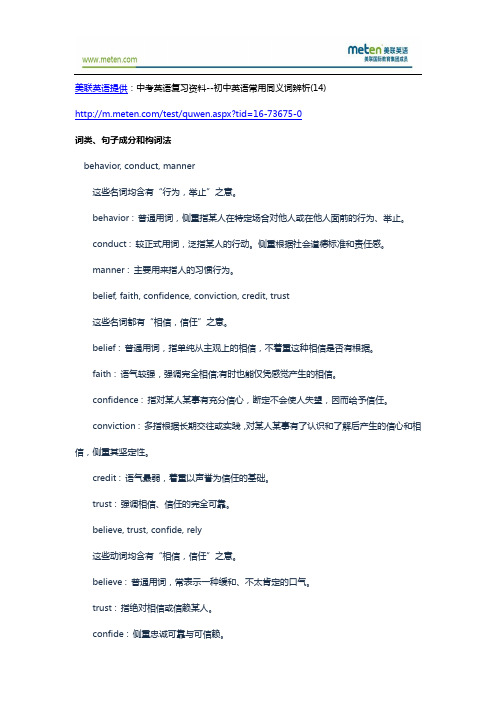
美联英语提供:中考英语复习资料--初中英语常用同义词辨析(14)词类、句子成分和构词法behavior, conduct, manner这些名词均含有“行为,举止”之意。
behavior : 普通用词,侧重指某人在特定场合对他人或在他人面前的行为、举止。
conduct : 较正式用词,泛指某人的行动。
侧重根据社会道德标准和责任感。
manner : 主要用来指人的习惯行为。
belief, faith, confidence, conviction, credit, trust这些名词都有“相信,信任”之意。
belief : 普通用词,指单纯从主观上的相信,不着重这种相信是否有根据。
faith : 语气较强,强调完全相信;有时也能仅凭感觉产生的相信。
confidence : 指对某人某事有充分信心,断定不会使人失望,因而给予信任。
conviction : 多指根据长期交往或实践,对某人某事有了认识和了解后产生的信心和相信,侧重其坚定性。
credit : 语气最弱,着重以声誉为信任的基础。
trust : 强调相信、信任的完全可靠。
believe, trust, confide, rely这些动词均含有“相信,信任”之意。
believe : 普通用词,常表示一种缓和、不太肯定的口气。
trust : 指绝对相信或信赖某人。
confide : 侧重忠诚可靠与可信赖。
rely : 指在相信的基础上可进一步依靠,着重可靠性。
below, beneath, under, underneath这些前置词均可表示位置“在……下面”之意。
below : 指位置低于某物或在某物下方,但不一定在正下方,所指范围较宽。
beneath : 书面用词,指紧挨……之下,其反义词是on。
under : 普通用词,与over相对,指在某物的正下方,含垂直在下的意思。
underneath : 书面口语均用,也常与beneath和under换用,但更含遮蔽的意味。
69组近义词辨析专项练习题(中考英语珍贵资料)
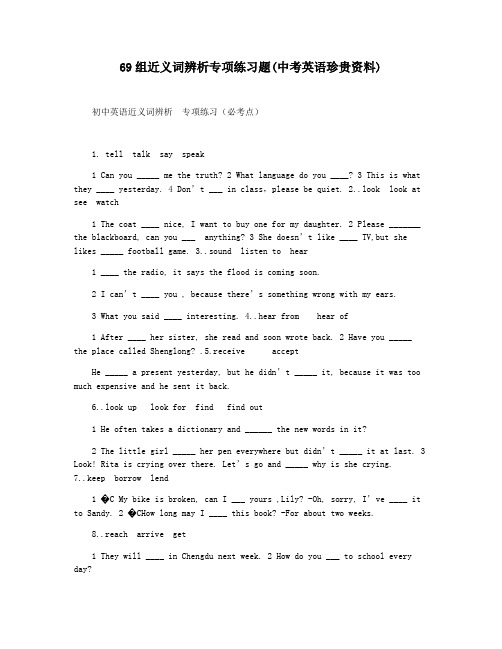
69组近义词辨析专项练习题(中考英语珍贵资料) 初中英语近义词辨析专项练习(必考点)1. tell talk say speak1 Can you _____ me the truth?2 What language do you ____?3 This is what they ____ yesterday.4 Don’t ___ in class,please be quiet. 2..look look at see watch1 The coat ____ nice, I want to buy one for my daughter.2 Please _______ the blackboard, can you ___ anything?3 She doesn’t like ____ TV,but she likes _____ football game. 3..sound listen to hear1 ____ the radio, it says the flood is coming soon.2 I can’t ____ you , because there’s something wrong with my ears.3 What you said ____ interesting. 4..hear from hear of1 After ____ her sister, she read and soon wrote back.2 Have you _____ the place called Shenglong? .5.receive acceptHe _____ a present yesterday, but he didn’t _____ it, because it was too much expensive and he sent it back.6..look up look for find find out1 He often takes a dictionary and ______ the new words in it?2 The little girl _____ her pen everywhere but didn’t _____ it at last.3 Look! Rita is crying over there. Let’s go and _____ why is she crying.7..keep borrow lend1 �C My bike is broken, can I ___ yours ,Lily? -Oh, sorry, I’ve ____ it to Sandy.2 �CHow long may I ____ this book? -For about two weeks.8..reach arrive get1 They will ____ in Chengdu next week.2 How do you ___ to school every day?3 Use a longer stick, then you can ____ the apples. 9..thanks to thanks for1 ______ your help, I’ve unde rstand it.2 ______ the cats, mice dare not come and eat my food. 10..give in give up11 We shouldn’t _____ learning English!2 I would rather die than _____ before my enemies. 11..achieve come true1 He works so hard that he is sure to___ his dream.2 His prediction of human’s flying to the moon _____. 12.turn off close turn on open1 _____ the windows please, it’s so cold outside.2 ____ the lightsbefore you leave the room. 3 The dog _____ the box and took the bone out!4 _____ the TV, I want to watch the NBA basketball games. 13.break off break out break into break down1 He was late for school yesterday, because his car ____ on the half way.2 The World WarⅡ ____ when she was only five.3 They ____ their friendship and didn’t talk to each other any more.4 Last night a thief _____ my house and took away my TV. 14. solve reply answersolve 解决(问题)及物动词常与problem 连用 reply 回复,答复不及物动词常与to连用 answer 回答及物动词常与question 连用 1 What did Mr Smith____ to what others said?2 No one in our class can ______ this question.3 It’s too difficult for everyone to ______ that problem. 15.hope wishhope 希望指较为现实的想法常有hope to do 或hope + 从句,但没有hope sb to dowish 希望指不太现实的要求或想法有wish to do 或 wish sb to do。
2019中考英语知识点:初中英语常用同义词辨析(100)
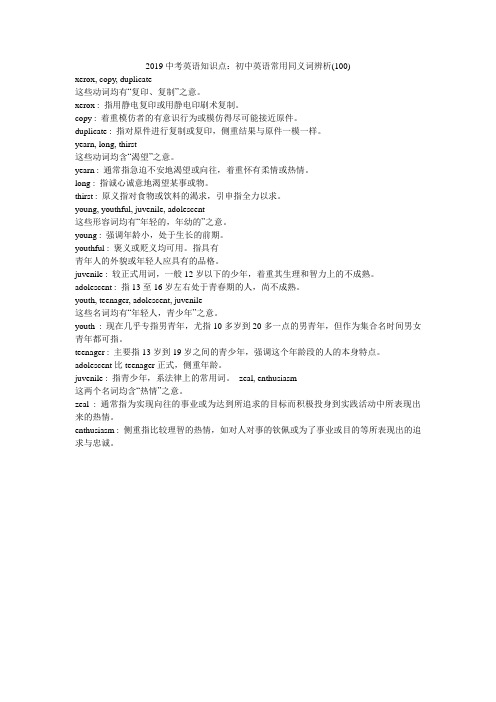
2019中考英语知识点:初中英语常用同义词辨析(100)xerox, copy, duplicate这些动词均有“复印、复制”之意。
xerox : 指用静电复印或用静电印刷术复制。
copy : 着重模仿者的有意识行为或模仿得尽可能接近原件。
duplicate : 指对原件进行复制或复印,侧重结果与原件一模一样。
yearn, long, thirst这些动词均含“渴望”之意。
yearn : 通常指急迫不安地渴望或向往,着重怀有柔情或热情。
long : 指诚心诚意地渴望某事或物。
thirst : 原义指对食物或饮料的渴求,引申指全力以求。
young, youthful, juvenile, adolescent这些形容词均有“年轻的,年幼的”之意。
young : 强调年龄小,处于生长的前期。
youthful : 褒义或贬义均可用。
指具有青年人的外貌或年轻人应具有的品格。
juvenile : 较正式用词,一般12岁以下的少年,着重其生理和智力上的不成熟。
adolescent : 指13至16岁左右处于青春期的人,尚不成熟。
youth, teenager, adolescent, juvenile这些名词均有“年轻人,青少年”之意。
youth : 现在几乎专指男青年,尤指10多岁到20多一点的男青年,但作为集合名时间男女青年都可指。
teenager : 主要指13岁到19岁之间的青少年,强调这个年龄段的人的本身特点。
adolescent比teenager正式,侧重年龄。
juvenile : 指青少年,系法律上的常用词。
zeal, enthusiasm这两个名词均含“热情”之意。
zeal : 通常指为实现向往的事业或为达到所追求的目标而积极投身到实践活动中所表现出来的热情。
enthusiasm : 侧重指比较理智的热情,如对人对事的钦佩或为了事业或目的等所表现出的追求与忠诚。
【最新】中考英语复习资料--初中英语常用同义词辨析(20)-范文word版 (2页)
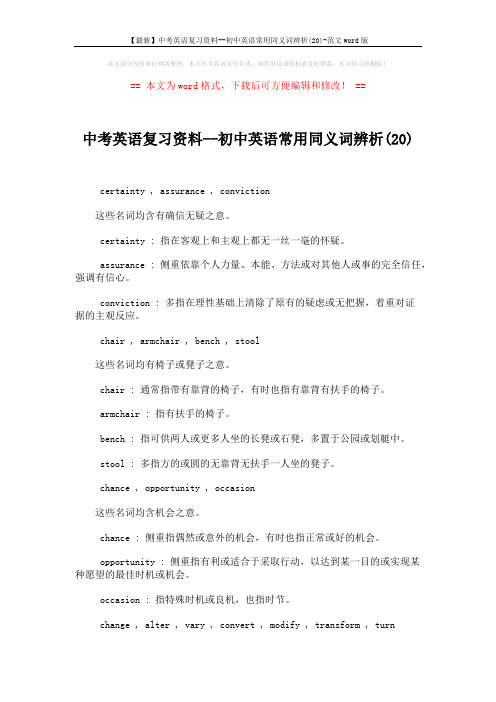
本文部分内容来自网络整理,本司不为其真实性负责,如有异议或侵权请及时联系,本司将立即删除!
== 本文为word格式,下载后可方便编辑和修改! ==
中考英语复习资料--初中英语常用同义词辨析(20)
certainty , assurance , conviction
这些名词均含有确信无疑之意。
certainty : 指在客观上和主观上都无一丝一毫的怀疑。
assurance : 侧重依靠个人力量、本能、方法或对其他人或事的完全信任,强调有信心。
conviction : 多指在理性基础上清除了原有的疑虑或无把握,着重对证
据的主观反应。
chair , armchair , bench , stool
这些名词均有椅子或凳子之意。
chair : 通常指带有靠背的椅子,有时也指有靠背有扶手的椅子。
armchair : 指有扶手的椅子。
bench : 指可供两人或更多人坐的长凳或石凳,多置于公园或划艇中。
stool : 多指方的或圆的无靠背无扶手一人坐的凳子。
chance , opportunity , occasion
这些名词均含机会之意。
chance : 侧重指偶然或意外的机会,有时也指正常或好的机会。
opportunity : 侧重指有利或适合于采取行动,以达到某一目的或实现某种愿望的最佳时机或机会。
occasion : 指特殊时机或良机,也指时节。
change , alter , vary , convert , modify , transform , turn
这些动词均含有变化,改变之意。
初中英语中考专题复习——动词语境辨析(实义动词+近义动词+感官动词)
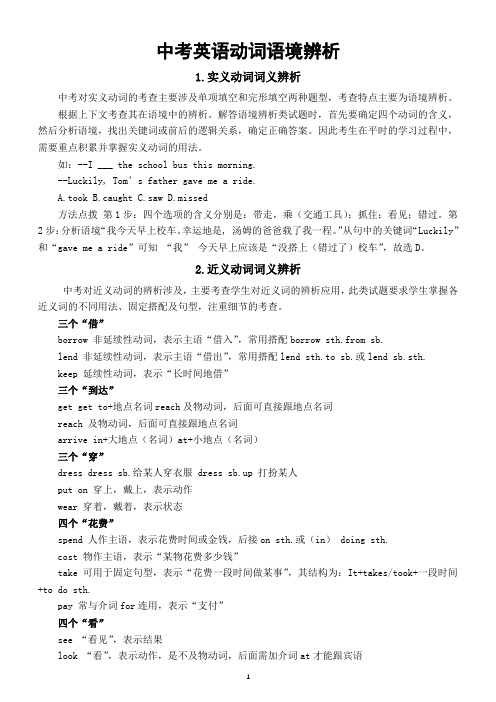
中考英语动词语境辨析1.实义动词词义辨析中考对实义动词的考查主要涉及单项填空和完形填空两种题型,考查特点主要为语境辨析。
根据上下文考查其在语境中的辨析。
解答语境辨析类试题时,首先要确定四个动词的含义,然后分析语境,找出关键词或前后的逻辑关系,确定正确答案。
因此考生在平时的学习过程中,需要重点积累并掌握实义动词的用法。
如:--I ___ the school bus this morning.--Luckily, Tom’s father gave me a ride.A.tookB.caughtC.sawD.missed方法点拨第1步:四个选项的含义分别是:带走,乘(交通工具);抓住;看见;错过。
第2步:分析语境“我今天早上校车。
幸运地是, 汤姆的爸爸载了我一程。
”从句中的关键词“Luckily”和“gave me a ride”可知“我”今天早上应该是“没搭上(错过了)校车”,故选D。
2.近义动词词义辨析中考对近义动词的辨析涉及,主要考查学生对近义词的辨析应用,此类试题要求学生掌握各近义词的不同用法、固定搭配及句型,注重细节的考查。
三个“借”borrow 非延续性动词,表示主语“借入”,常用搭配borrow sth.from sb.lend 非延续性动词,表示主语“借出”,常用搭配lend sth.to sb.或lend sb.sth.keep 延续性动词,表示“长时间地借”三个“到达”get get to+地点名词reach及物动词,后面可直接跟地点名词reach 及物动词,后面可直接跟地点名词arrive in+大地点(名词)at+小地点(名词)三个“穿”dress dress sb.给某人穿衣服 dress sb.up 打扮某人put on 穿上,戴上,表示动作wear 穿着,戴着,表示状态四个“花费”spend 人作主语,表示花费时间或金钱,后接on sth.或(in) doing sth.cost 物作主语,表示“某物花费多少钱”take 可用于固定句型,表示“花费一段时间做某事”,其结构为:It+takes/took+一段时间+to do sth.pay 常与介词for连用,表示“支付”四个“看”see “看见”,表示结果look “看”,表示动作,是不及物动词,后面需加介词at才能跟宾语watch “观看(比赛、电视等)”read “看(书、报等)”,表示阅读四个“说”speak 作及物动词时后接表示语言的名词,表示“说,讲述”say 常跟直接引语或间接引语,表示说的内容talk 是不及物动词,常跟介词to和with,意为“同……谈话”,也表示具有说话能力tell 意为“告诉”,与story连用,意为“讲故事”四个“拿”bring “带来,拿来”,表示拿到靠近说话人的地方take “拿去,带走”,表示拿到远离说话人的地方carry “扛,搬,用力移动”,没有方向fetch “去取,去拿”,表示往返拿东西四个“赢,输”lose 意为“输给”某人,固定搭配为lose to sb.fail 意为“失败”或“未做成某事”beat 意为“打败”,后接人或某支队伍win 意为“赢得,荣誉,地位,比赛等”四个“参加”join 一般指加入“党派”或“组织”并成为其中一员,如参军,入党,入团等join in 指参加竞赛、娱乐、游戏等活动take part in 指参加聚会或群众性活动attend 一般指出席会议、典礼、婚礼等四个“变化”turn 一般用于颜色的变化get 天变黑、变长或变短become 天气变暖或变冷等,表示渐变grow 形状变大或变小3.感官动词词义辨析sound 意为“听起来……”指听觉。
中考英语43组高频近义词辨析详解

中考英语43组高频近义词辨析详解1、近义词辨析:accept 和receiv eaccept 是“接受、认可“的意思,是收到并接受;receive 有”收到“的意思,但不一定接受。
e.g. I received a lot of gifts on my birthday, but I didn’t accept any.生日那天我收到许多礼物,但是我并没有收下任何礼物。
2、近义词辨析:ago 和beforeago: 应注意两点:1.用于一般过去时;2. 它所指的时间是从现在算起。
before: 也应该注意两点:1.用于过去完成时;2. 她所指的时间不是从现在算起,而是从过去某一时刻算起。
e.g. A short time before, tall trees had covered the country for many miles around. 在那时不久之前,高大的树木覆盖着方圆数英里。
3近义词辨析:agree to 和agree withagree to: 意思是“同意”,后面接表示计划、安排、意见、条件之类的名词或动词原形,表示愿意协助工作。
e.g. Do you agree to this agreement? 你同意这项协议吗?He didn’t agree to help us. 他不同意帮助我们。
agree with: 意思是“与……(意见)一致”后面一般接人,也可接意见、看法等。
但不含有协助的意思。
e.g. I don’t agree with what you sai d. 我不同意你说的话。
I don’t agree with your idea. 我不同意你的主意。
alone 指“独自一人胡”,强调客观事实,通常只放在动词、系动词之后,作表语。
e.g. He was alone in the room. 他独自一人在屋里。
lonely 指“孤单的”、“孤独的”,表示主观感觉,在句中作表语或定语。
中考英语同义词近义词相似词语辨析_4
中考英语同义词、近义词、相似词语辨析郝小兴选择填空。
1. He a lot of time playing computer games on weekends.A. takesB. costsC. paysD. spends2. The clothes in that shop are quite beautiful, but most of them too much.A. payB. spendC. takeD. cost3. We will Beijing at about five o’clok tomorrowmorning.A. arrive atB. arrive inC. reach toD. get4. Today Jim his white shirt and brown trousers.A. is putting onB. is wearingC. is dressingD. in5. Is the woman yellow your teacher?A. inB. putting onC. wearingD. dressing6.—Bob, may I your MP4?—Sure. But you’d better not it to others.A. keep; lendB. lend; borrowC. borrow; keepD. borrow; lend7. Don’t forget to “Thank you” when someone opens the doo r for you.A. tellB. sayC. speakD. talk8.Our newspaper represents the of the people.A. shoutB. noiseC. voiceD. cry9. Let’s get some about tourism on the Internet.A. informationB. messageC. inventionD. book10.—Could you give me two on how to learn English well? —Sure.A. suggestionsB. messagesC. informationD. advice11. We’re busy because we have so housework to do today.A. fewB. littleC. manyD. much12. There is milk at home. We have to buy some this afternoon.A. a littleB. littleC. a fewD. few13. —I’d like grapes and pears.—Oh, I only need orange juice.A. some; a fewB. a few; someC. a little; fewD. a little; a few14. I invited Joe and Linda to dinner, but of them came.A. neitherB. eitherC. noneD. both15.—There’s coffee and tea; you can have .—Thanks.A. eitherB. eachC. oneD. it16.“Have try, you are so close to the answer,”the teacher said to Eric.A. the otherB. one anotherC. otherD. another17. My sister has two skirts. One is yellow; is black.A. otherB. anotherC. othersD. the other18. We don’t have enough nurses to look after the patients. At least are needed.A. tn another nursesB. more ten nursesC. other ten nursesD. another ten nurses19. Sam looks like his dad. They are tall.A. eitherB. anyC. allD. both20. —Which of the two T-shirts will you take?—I’ll take , one for my brother, the other for myself.A. eitherB. neitherC. allD. both21.—What the number of the students in your school? —About two thousands. A number of them from England.A. is ; areB. is ; isC. are ; isD. are ; are22. the teachers in their school is about 200 and one fourth of them are teachers.A. A number of ; womenB.A number of ; womanC. The number of ; womenD. The number of ; woman23.—Guess how much it costs?—I think it costs 15 and 20 dollars.A. fromB. betweenC. amongD.with24.—What do you often do classes to relax yourself?—Listen to music.A. overB. amongC. betweenD. through25.—The cake looks .—Yes, and it tastes even _______.A. well ; goodB.nice ; betterC. good; worseD. better; best26. I didn’t sle ep ______ last night. I feel tired now.A. wellB. niceC. fineD. good27.—_______ do you visit your grandparents?—Once a week.A. How longB. How oftenC. How soonD. How many28.—_______ will the 30th London Olympic Games be held, do you know?—In two years.A. How longB. How oftenC. How soonD.How much29.—Granny, you look so weak. What’s wrong with you? —Terrible. The factory made _______ noise. It was ______ noisy that I couldn’t sleep well last night.A. too much; soB. much too; soC. too much; tooD. too much; much too30.—Has John come _______?—Yes. He has ______ been here for 10 minutes.A. yet ; alreadyB. already ; yetC. already ; alreadyD. yet ; yet【辨析与讲解】1.spend,take,cost,paySpend的宾语通常是时间、金钱。
初中英语中考易混易错同义词辨析大全
初中英语易混易错同义词辨析大全1., ,统指各种衣服,谓语动词永远是复数,指布,为不可数名词服装的总称,指一件衣服用a ,2.,指小事件, 指不幸的事故 .3.,后接不可数名词,后接可数名词 a4., ,家,包括住处和家人,房子,住宅,家庭成员. a .5., ,自然界各种各样的声音,人的嗓音,噪音I .6., ,用照相机拍摄的照片,可指相片,图片,电影片,画的画’s a .7.,词汇,一个人拥有的单词量,具体的单词 a .8.,人口,人数,具体的人 a .9.,一天内具体的天气状况,长期的气候状况 .10., , ,具体的公路,马路,街道,小路,小径,道路,途径; , .11. ,课程〔可包括多门科目〕,科目〔具体的学科〕a12.,传统风俗,习俗,也可指生活习惯,后接,生活习惯,习惯成自然,后接. I’ a .13.,指造成某一事实或现象的直接原因,后接,用来解释某种现象或结果的理由,后接 .14., ,运动,锻炼〔不可数〕,练习〔可数〕,〔反复做的〕练习 .15.,作"课"解时,两者可以替换.指课文用. 指班级或全体学生用. 6; 516. , ,指在公共场所所做的经过准备的较正式的演说,日常生活中的一般的谈话,讲话,学术性的演讲,讲课 a …17.,部队的军官,政府官员18.,二者均指工作。
不可数,可数 a19.,主要指人或动物,多指由两局部组成的东西 a20. , , ,侧重指幅员,疆域,指人民,国民,民族,侧重指政府,政体,国土,国家 .21.,厨师,厨具 a .22.,不可数名词, 损害,损失; 复数形式, 赔偿金 $90023.,警察的总称,后接复数谓语动词,指某个具体的警察 .24. ,常和困难连系,前面的动词常为 , , ,常和疑问连系,多和, 连用25., a人类,a 一个男人 .26.,二者均可指小鸡,还可以当鸡肉 .27.,当电报解时,指具体的,指抽象的 a ,28., , ,是最常用的,指短期的旅途,指稍长的旅途,指海上航行 a29.,多指户外的游戏或娱乐活动,如打球,游泳,打猎,赛马等;指决定胜负的游戏,通常有一套规那么 .30.,价格,奖,奖品,奖金 .31. a ,a 许多,谓语动词用复数。
中考英语近义词辨析(七)
中考英语近义词辨析(七)
18. aim/ purpose/ objectⅠ. aim “目的指抱有一种明确的目的,并意味着为之实现而竭尽全力。
如① What;s your aim in life?你的人生目的是什么?② The ultimate aim of the Party is the realization of communism.党的最终目的是实现共产主义。
Ⅱ. purpose “目的指心中有打算,并意味着对所作的打算有较大的决心。
如① It was done with a definite purpose. 做这件事具有一个明确的目的。
② For what purpose (purposes) do you want to go to Canada?你要去加拿大的目的何在?Ⅲ. object “目的含有比较具体的意味。
往往指在我们的行为中,需要或希望直接达到的目的。
如① The object of my visit is to consult you. 我访问的目的是来和你商量。
② What is your object in studying English?你学英文的目的何在?[注]以上这几个词的涵义虽有差别,但在语言实践中,常被毫无区别地使用着。
【优质文档】中考英语复习资料--初中英语常用同义词辨析(87)-范文word版 (1页)
【优质文档】中考英语复习资料--初中英语常用同义词辨析(87)-范文word版本文部分内容来自网络整理,本司不为其真实性负责,如有异议或侵权请及时联系,本司将立即删除!== 本文为word格式,下载后可方便编辑和修改! ==中考英语复习资料--初中英语常用同义词辨析(87)shock , impact , collision , clash这些名词均含冲击,碰撞之意。
shock : 指强烈冲击在肉体上或思想感情上所产生的效果。
impact : 正式用词,侧重指物体相撞的结果或接触点。
collision : 指物体相撞,其结果不是受损就是严重受阻。
clash : 通常指两个或多个物体,特别是金属物发出刺耳声音或破裂声的撞击。
也可引申指意见、利益等的冲突。
share , participate这两个动词均含有分享,分担之意。
share : 普通用词,指与他人共同享受拥有或共同使用某物,或共同承担某项工作或费用等。
participate : 主要指参与某事。
shorten , abbreviate , abridge , cut这些动词均含有缩短之意。
shorten : 通常指缩短时间、尺寸或过程。
abbreviate : 指省去应有的或后续的部分,从而使整体缩短。
也可指缩短时间。
abridge : 多指对书籍的删节或缩短,删去不重要部分而保存其精华。
cut : 普通用词,指任何缩短而缩减的过程。
show , exhibit , display , manifest , demonstrate这些动词均含显示、显露、展现之意。
- 1、下载文档前请自行甄别文档内容的完整性,平台不提供额外的编辑、内容补充、找答案等附加服务。
- 2、"仅部分预览"的文档,不可在线预览部分如存在完整性等问题,可反馈申请退款(可完整预览的文档不适用该条件!)。
- 3、如文档侵犯您的权益,请联系客服反馈,我们会尽快为您处理(人工客服工作时间:9:00-18:30)。
1 / 18 初中英语近义词辨析中考复习 , cloth, clothing clothes统指各种衣服,谓语动词永远是复数,cloth指布,为不可数名词clothing服装的总称,指一件衣服用a piece of, an article of
, house, home home家,包括住处和家人,house房子,住宅,family家庭成员. My family is a happy one.
, voice, noise sound自然界各种各样的声音,voice人的嗓音,noise噪音I hate the loud noise outside.
, picture, drawing photo用照相机拍摄的照片,picture可指相片,图片,电影片,drawing画的画.
, people population人口,人数,people具体的人China has alarge population. , street, path, way road具体的公路,马路,street街道,path小路,小径,way道路,途径 take this road; in the street, show me the way to the museum. , habit custom传统风俗,习俗,也可指生活习惯,后接to do,habit生活习惯,习惯成自然,后接of doing. I've gotthe habit of drinking a lot.
, exercises, practice 2 / 18
exercise运动,锻炼(不可数),exercises练习(可数),practice(反复做的)练习
Practice makes perfect. , lesson 作"课"解时,两者可以替换.指课文用lesson.指班级或全体学生用class. Lesson 6; class 5.
, official officer部队的军官,official政府官员an army officer, job 二者均指工作。work不可数,job可数a good job, pair couple主要指人或动物,pair多指由两部分组成的东西a pair of trousers , nation, state, land country侧重指版图,疆域,nation指人民,国民,民族,state侧重指政府,政体,land国土,国家Thewhole nation was sad at the news.
, policeman police警察的总称,后接复数谓语动词,policeman指某个具体的警察Thepolicearequestioningeveryone in the house.
, question problem常和困难连系,前面的动词常为think about,solve,raise,question常和疑问连系,多和ask,answer连用.
, chicken 二者均可指小鸡,chicken还可以当鸡肉The chickenis delicious. , journey, travel, voyage 3 / 18
travel是最常用的,trip指短期的旅途,journey指稍长的旅途,voyage指海上航行a three-day trip, game
sport多指户外的游戏或娱乐活动,如打球,游泳,打猎,赛马等;game指决定胜负的游戏,通常有一套规则His favorite sport is swimming.
, prize price价格,prize奖,奖品,奖金win the first prize,The price is high/low. number of, the number of a number of许多,谓语动词用复数。the number of…的数目,谓语动词用单数。The number of studentsis increasing.
front of, in the front of in front of范围外的前面,in the front of范围内的前面In the front of the room sits a boy.
of us, the three of us three of us我们(不止三个)中的三个,the three ofus我们三个(就三个人)The three of us---Tom, Jackand I went to the cinema.
bus, on the bus by bus表手段,方式,不用冠词,on the bus表范围They went there by bus. year, the next year next year将来时间状语,the next year过去将来时间状语He said he would go abroad the next year.place of, in the place of
inplaceof代替,intheplaceof在…地方Anewbuilding is built in the place of the old one.girl, one girl
a girl可泛指所有女孩, one girl一个女孩Can one girlcarry such a big box 4 / 18
doctor and teacher, the doctor and the teacherthe doctor and teacher指一个人,既是医生又是老师,the doctor and the teacher两个人,一个医生和一个老师the doctor and teacher is
bed, on the bed in bed卧在床上,on the bed在床上The book is onthe bed. He is ill in bed. charge of, in the charge of in charge of管理,负责照料,in the charge of由……照料He is in charge of the matter. The matter is inthe charge of her.
class, in the class in class在课上,in the class在班级里He is the beststudent in the class. second, the second a second又一,再一,the second第…… He won thesecond prize. , one it同一物体,one同类不同一I lost my pen. I have tobuy a new one. , this that指代上文所提到的,this导出下文所要说的I wasill. That's why… , nothing, no one none强调有多少,nothing,noone强调有没有,nothing指物,no one指人 ---How many…/How much…--- None. , any one anyone指人,不能接of,any one指人物均可,可接of any one of you , what 5 / 18
who指姓名或关系,what指职业或地位What is yourdad He is a teacher. , which what的选择基础是无限制的,which在一定范围内进行选择 Which do you prefer, bananas or apples , another other后接名词复数,another后接名词单数otherstudents, another student , much, a lot of many和可数名词连用,much和不可数名词连用,a lotof可数,不可数均可,但不用于否定句Ihaven'tmany books.
more…than, many more…than muchmore…than后接形容词或不可数名词,manymore…than后接可数名词manymorepeople,much more water, much more beautiful
, not no=nota/anynofriend=nota/anyfriendnowater=not any water oneself, for oneself, to oneself, of oneselfbyoneself单独的,独自的,foroneself为自己,tooneself供自己用的,of oneself自行的,自动的The door opened of itself.
all, after all at all根本,全然, after all到底,毕竟After all he is achild. , high tall常指人或动物,high常指物体He is tall., quickly fast侧重于指人或物体具有运动速度快的特点,quickly侧重指某事完成或发生的快runfast,answer the question quickly 6 / 18
, healthful healthy健康的,健壮的,healthful有益于健康的healthful exercise , asleep, sleepy sleeping正在睡觉,asleep睡着,熟睡,只能做表语,sleepy困的,有睡意的
a sleeping baby The baby is asleep. I'm sleepy., very just表强调时是副词,作状语,very表强调时是形容词,用作定语the very man, just the man, true
real真的,真实的,指的是事实上存在而不是想象的,true真的,真正的,指的是事实和实际情况相符合real gold, a true story
, pleased, pleasing pleasant常用作定语,pleased, pleasing常用作表语,pleased主语常为人, pleasing主语常为物apleasanttripThetripispleasing. , sick ill做表语,sick定,表均可a sick boy , well good形容词,well副词,但指身体状况是形容词He iswell again. , silent, still quiet安静的,可以发出小的声音,silent不发出声音,但可以动,still完全不动,完全无声响Hestandthere still.他站在那儿,一动不动,也不说话。
